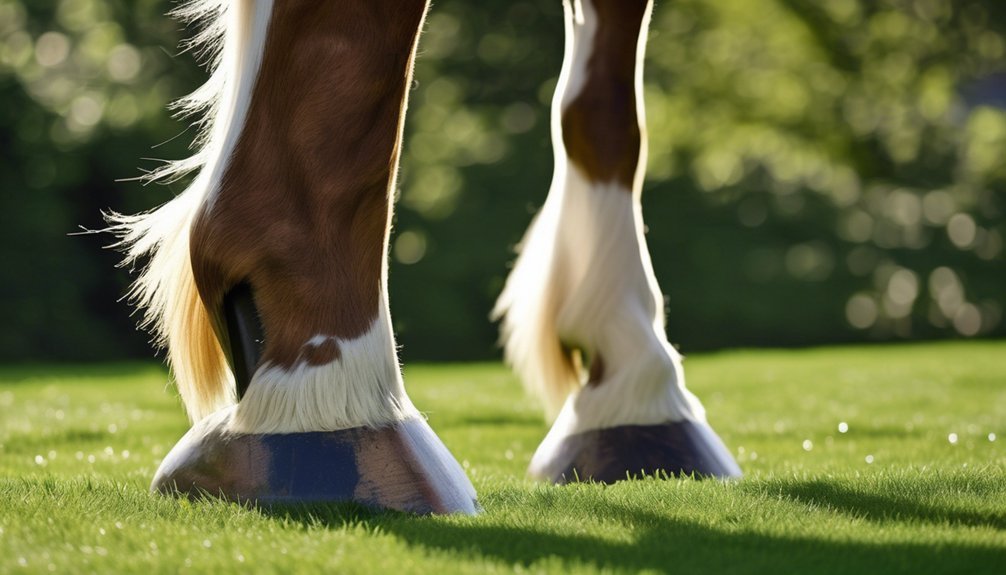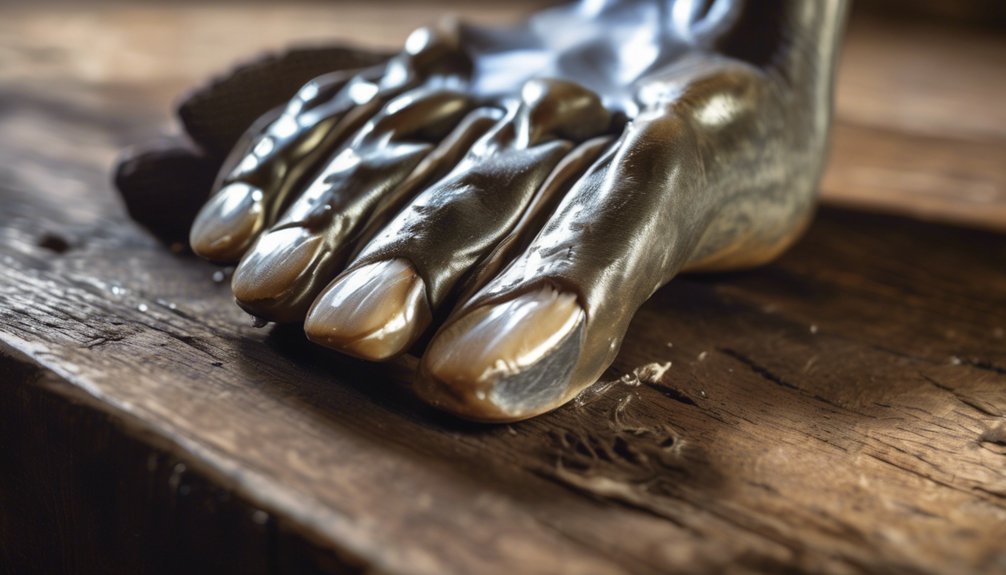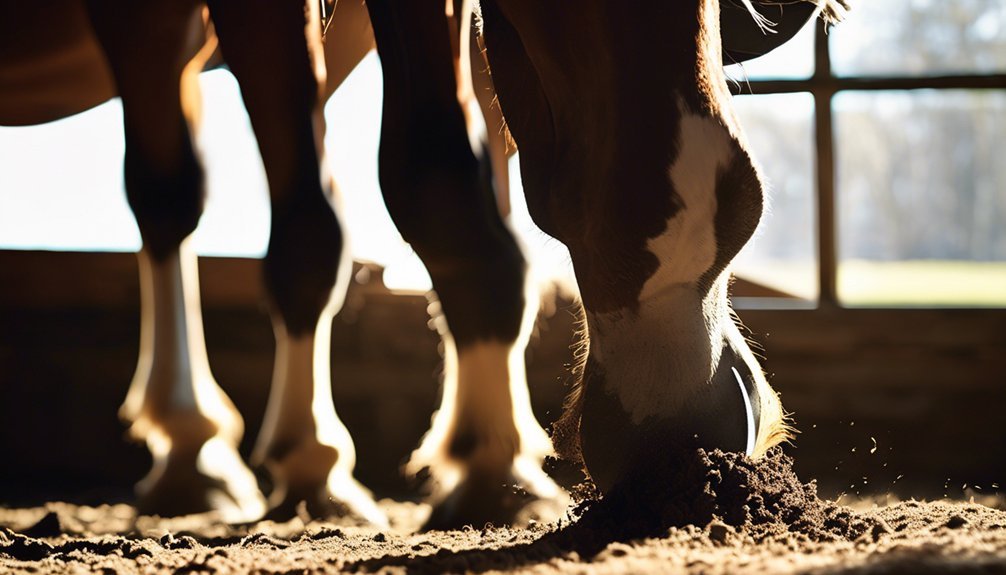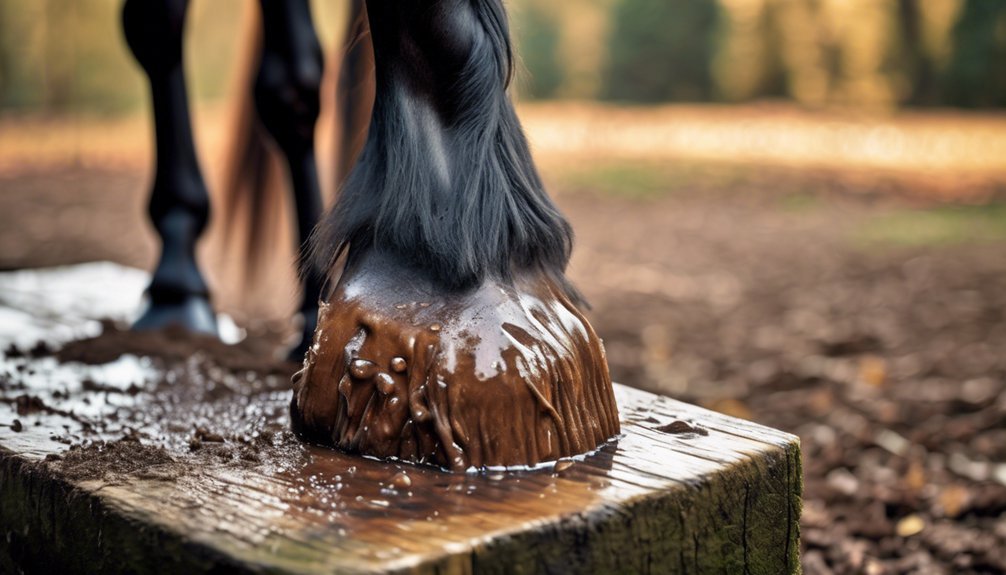
Imagine a well-tuned engine; every part must function smoothly for optimal performance. Similarly, regular hoof cleaning is vital for your horse's health and efficiency. It prevents infections and enhances circulation, ensuring your horse remains agile across various terrains. But what happens when you neglect this essential task? The implications can be serious, affecting not just performance but your bond with your horse. Let's examine the profound benefits of maintaining proper hoof hygiene.
Key Takeaways
- Regular hoof cleaning prevents infections, such as thrush, and maintains overall hoof health.
- Consistent care helps detect early signs of issues, allowing for timely interventions.
- Clean hooves improve circulation and nutrient absorption, enhancing the horse's well-being.
- Prioritized hoof hygiene boosts performance, comfort, and agility on various terrains.
- A proactive approach to hoof care strengthens the bond between horse and owner.
Understanding the Anatomy of Horse Hooves

To appreciate the importance of regular hoof cleaning, you first need to understand the intricate anatomy of horse hooves.
The hoof structure consists of several key components: the hoof wall, sole, frog, and digital cushion. Each part plays a specific role in supporting the horse's weight and absorbing shock.
The hoof wall protects the internal structures, while the sole shields the sensitive tissues beneath. The frog aids in circulation and traction, and the digital cushion provides further shock absorption.
Regular cleaning helps maintain these functions by removing debris and preventing infections, ensuring optimal health.
When you grasp this anatomy, you'll realize that attentive hoof care is essential for your horse's overall well-being and performance.
Preventing Common Hoof Problems
Regular hoof care can prevent a multitude of common hoof problems that can affect your horse's health and performance.
By maintaining a consistent hoof cleaning routine, you can significantly reduce the risk of issues such as:
- Hoof infections
- Thrush development
- Cracks and splits
- Unwanted odors
Incorporating thrush prevention measures, like ensuring proper moisture control and keeping the hooves clean, is essential.
Regularly inspecting your horse's hooves allows you to identify early signs of infection or other concerns.
Additionally, applying appropriate treatments when necessary will help maintain hoof integrity.
Enhancing Overall Health and Well-being

Consistent hoof cleaning not only prevents common issues but also plays a vital role in enhancing your horse's overall health and well-being.
By maintaining proper hoof hygiene, you significantly reduce the risk of infections, thrush, and other ailments that can compromise your horse's vitality. Clean hooves promote better circulation, allowing for optimal nutrient absorption and overall health.
Moreover, regular cleaning helps you detect early signs of potential problems, enabling timely intervention. This proactive approach fosters a deeper bond between you and your horse, as you prioritize their care.
Ultimately, the hoof hygiene benefits extend beyond just the feet; they contribute to your horse's happiness, ensuring they thrive in all aspects of life.
Improving Performance and Comfort
When you prioritize hoof cleaning, you directly enhance your horse's performance and comfort during various activities.
Regular hoof care ensures that your horse experiences fewer distractions, allowing for better focus and higher efficiency in movement.
- Increases hoof performance on different terrains
- Reduces the risk of injuries and discomfort
- Promotes better balance and agility
- Enhances overall stamina and endurance
Strengthening the Bond Between Horse and Owner

While you focus on hoof cleaning, you're also cultivating a stronger bond with your horse. This routine not only enhances their health but also fosters trust building.
As you handle your horse's hooves, you create a space for them to feel safe and understood. Your gentle touch and consistent presence encourage an emotional connection that deepens over time.
Each cleaning session becomes an opportunity for communication; your horse learns to trust you further with every careful inspection. This process reinforces mutual respect, making your partnership stronger.
The more you engage in hoof care, the more your horse relies on you, strengthening the bond that exists between you both.
Ultimately, you'll find that this trust transforms your relationship into one marked by genuine intimacy.
Identifying Early Signs of Issues
Regular hoof cleaning not only maintains hygiene but also allows you to identify early signs of potential issues before they escalate.
Pay close attention during your routine checks; your horse's hooves can reveal a lot. Here are some key indicators to watch for:
- Hoof discoloration: Changes in color might indicate underlying health issues.
- Hoof sensitivity: If your horse flinches or shows discomfort, it could signal pain or injury.
- Unusual odors: Foul smells can suggest infections or thrush.
- Cracks or chips: These can lead to more serious problems if not addressed promptly.
Tips for Effective Hoof Cleaning

Effective hoof cleaning is essential for your horse's overall health, so it's crucial to adopt the right techniques.
Start by gathering the proper hoof care tools, including a hoof pick, a stiff brush, and a soft cloth. When cleaning, secure your horse safely to prevent sudden movements.
Use the hoof pick to remove dirt and debris from the frog and sole, being careful not to injure sensitive areas. Follow up with the stiff brush to clear away any remaining dirt. If you spot any irregularities, take note for future reference.
Finally, finish with a soft cloth to wipe down the hoof. Regularly practicing these cleaning techniques not only maintains hoof health but also fosters a closer bond between you and your horse.
Creating a Regular Hoof Care Schedule
Establishing a consistent hoof care schedule is vital for maintaining your horse's foot health. By implementing a regular hoof care routine, you can prevent issues before they arise.
Here are some tips to help you create an effective schedule:
- Set specific days for cleaning and inspection.
- Use scheduling reminders on your phone or calendar.
- Keep a record of hoof health and any changes.
- Adjust the routine based on your horse's activity and environment.
Consistency is key; regular attention to your horse's hooves ensures you catch problems early.
Frequently Asked Questions
How Often Should I Clean My Horse's Hooves?
You should clean your horse's hooves at least every other day to ensure optimal hoof health maintenance. This hoof care frequency helps prevent issues and promotes overall well-being, keeping your equine partner happy and healthy.
What Tools Are Essential for Hoof Cleaning?
For effective hoof cleaning, you'll need a hoof pick, a stiff brush, and a soft rag. Establishing a regular cleaning schedule ensures your horse's hooves stay healthy and free from debris, enhancing their overall well-being.
Can Hoof Cleaning Prevent Thrush?
Yes, regular hoof cleaning can serve as a key preventative measure against thrush. By maintaining cleanliness, you reduce moisture buildup, a primary factor in thrush development, complementing your thrush treatment efforts effectively.
Should I Clean Hooves After Riding?
Sure, skip cleaning hooves after riding—who needs hoof health anyway? But really, incorporating it into your riding routine is crucial. It prevents dirt buildup and ensures your horse's hooves stay healthy and happy.
What Signs Indicate a Need for Professional Hoof Care?
If you notice hoof discoloration or increased sensitivity, it's time to seek professional hoof care. These signs often indicate underlying issues that could worsen without proper attention, so don't hesitate to get expert help.
Conclusion
Regular hoof cleaning isn't just a routine; it's a cornerstone of your horse's health. Coincidentally, while you're preventing infections and enhancing performance, you're also deepening your bond with your horse. Each time you inspect those hooves, you're not just caring for them—you're fostering trust and communication. Prioritizing this essential practice allows you to catch potential issues early and ensure your horse remains comfortable and agile, ready to tackle any terrain with confidence.





